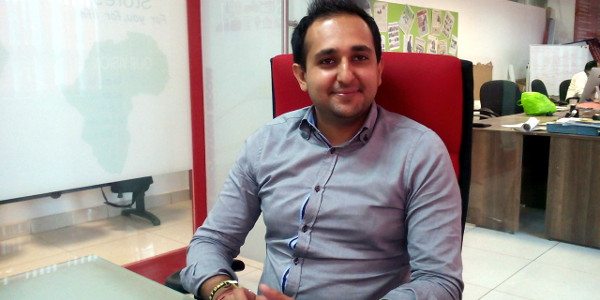Trushar Khetia is one of Kenya’s most outstanding young entrepreneurs. The 30-year-old serial entrepreneur is the founder of Tria Group, an outdoor advertising firm that uses public transit vehicles to market leading consumer goods in Kenya.
Tria, which was founded in 2013, places advertising on more than 200 buses in Nairobi for clients such as Unilever, Google, HP, Dell and Konica Minolta. The company has annual revenues exceeding $1.3 million.
Khetia is also the founder of Society Stores, one of the most popular supermarkets in Thika, a thriving industrial town 40 kilometres northeast of Nairobi. The four-storey retail outlet is doing more than $6 million in annual revenues and Khetia is set to open two other stores before the end of this year.
Khetia’s two companies have combined revenues of more than $7 million. I recently had a chat with him where he recounted his entrepreneurial journey, reflected on the lessons he has learned along the way and spoke about his plans.
Tell us more about your background
I was born on the 29th of November 1986 in a small town in the western part of Kenya called Kitale which is still my home and where my parents live. I did my primary in Kitale in a government school, before moving to Nairobi for my high school (O & A levels).
After High school, I went to study at the Manchester Business School which is part of the University of Manchester when I was 17 years old. I studied Management with a Specialism in Marketing. I have always been the youngest in my year/batch and have always been very strong academically.
I have worked in several small jobs across the university from video library sales to perfume shops, and charity fundraising. Always I have enjoyed sales roles as that is where I found my strength in being able to persuade people. My first major employment was as a Marketing Manager at Securex in Nairobi for 6 months whilst being a part-time DJ at the same time at Pavement Club in Nairobi.
After graduating in the UK, I worked for Procter & Gamble (P&G) for 3 years as a business development manager looking after some of UK’s biggest retailers. I successfully grew every single business I was given and was promoted 3 times in the space of 3 years.
Finally, in June 2011 I decided to come back home to Kitale, Kenya to join and grow my family business as they needed me back at the time and I felt that I would fulfil my entrepreneurial ambitions with them.
However, one year down the line, I realized this was not to be as my growth and potential was being limited by certain members of the family and I was not prepared to compromise on where I wanted to go in life, so I decided to leave the family business and move to Nairobi to start Tria Group. This is where my journey as an entrepreneur started.
How did you get started as an entrepreneur?
Interestingly, when I wanted to get inspiration for starting Tria, I looked back at my young age in school to what I had achieved and I realized that entrepreneurship had been in me since a very young age.
In Year 4 when I was barely 8 years old, I had and still have a passion of reading books. At that age it was all about comic books and children’s storybooks. As I was an avid reader, I would finish one book within a few days and move on to the next one. I realized an opportunity when I saw how many of my school friends would like to borrow the books I was reading.
This gave me the idea of starting a book library where I would charge a few shillings to my colleagues to borrow the book. By the time it went around my class, the book would have paid back for itself. Even my teachers started borrowing books from me for their own kids! I didn’t realize at that time that what I was running was a business.
For me it was fun, a way to make money to buy sweets and chocolates for myself and my friends in school. It was purely driven for my passion for books and I saw why my colleagues shouldn’t also enjoy the same privilege of gaining knowledge.
A year later in Year 5 when I was 9 years old, I saw a second opportunity. Our school canteen was selling boxes of biscuits which were mainly bought by the boarders for their daily tea time as my government school was 90% a boarding school with us being a few of the day scholars.
I realized they were overcharging the student compared to how much our own family wholesale shop was selling the same biscuits for. So I started by bringing a few boxes to school on credit from our shop with a promise to pay them back, and started selling them in school to the students at a much cheaper price than the school canteen.
This was a win-win for all since they saved money and I made a profit for my family’s shop. Only later I came to realize that I was running a retail business. Again for me the fun was in selling and saving money for my friends whilst also proudly bringing money back home to the family’s shop as a 9-year-old! What started with 3-4 boxes a week became 20-30 boxes. It was an amazing experience!
This gave me an inspiration to start business as I told myself that I had already been an entrepreneur without realizing at such a young age.
Your company, Tria Group is one of the leading lights in the in-transit advertising sector in Kenya and Tanzania. What inspired your entry into this line of business? Also, how many clients do you have now and how successful is the business in terms of revenue and reach?
My inspiration for starting Tria came from two sources. One was my time in the UK both as a student and working where my main form of transport was the public buses, trains and underground tubes. Ii realized what a huge media space this was as in UK every single bus, train and taxi had advertisements all over both inside and outside. I researched more into the companies who were in this industry and realized that they only focused on transit media yet they had revenues of over a million pounds!
You are quite young. Has your young age been an asset or a liability in the pursuit of your business?
My age has always been an asset! Starting early has meant I have practically learnt business and life lessons 5 years ahead of my time. I started failing early, learning from my mistakes early and finally achieving the success early as well. No university will teach you life skills and street-smart business skills. You have to learn this by doing, by risking and putting yourself on the line day in day out.
What does success mean to you?
Real success is about leaving a name and legacy behind that outlives you even if you die. To me it is leaving a scratch, a mark on this planet, that I did something good, I made a difference, I had an impact to peoples’ lives during my time on earth!
It is not primarily about the money you make in the process. A lot of people think that success is money. What I believe is that money is just but a thermometer of how successful you are. And real long term success is purely driven by your passion and ambitions.
Any words of wisdom for young African entrepreneurs that are afraid of starting something?
The biggest fear you should have in life is not doing enough with it. I am not afraid of death but afraid of dying too early before I have fulfilled all that I need to.
A lot of young African entrepreneurs have great ideas, but do not have the courage or mindset to take the risk with their idea and action. So in the end, they end up being their own biggest barrier to success purely because they lack self-belief and self-confidence and a positive mindset which forms the core of the success. Yet they will find excuses that it is their family or society or their employers that are holding them back. If you do not take risks in life, then what is the point of living, where you are chained by your own fears of failure. You have to break yourself free in order to experience your true fullest potential.








